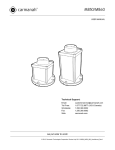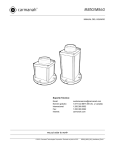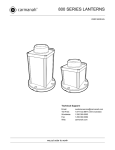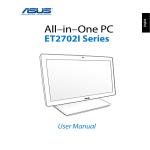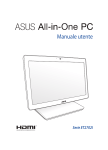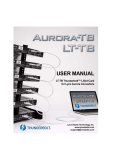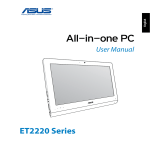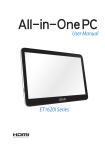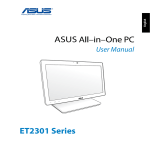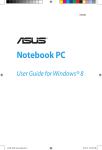Download ASUS ET2300INTIB040K User's Manual
Transcript
English ET2300 Series User Manual E7622 August 2012 English COPYRIGHT INFORMATION No part of this manual, including the products and software described in it, may be reproduced, transmitted, transcribed, stored in a retrieval system, or translated into any language in any form or by any means, except documentation kept by the purchaser for backup purposes, without the express written permission of ASUSTeK COMPUTER INC. (“ASUS”). ASUS PROVIDES THIS MANUAL “AS IS” WITHOUT WARRANTY OF ANY KIND, EITHER EXPRESS OR IMPLIED, INCLUDING BUT NOT LIMITED TO THE IMPLIED WARRANTIES OR CONDITIONS OF MERCHANTABILITY OR FITNESS FOR A PARTICULAR PURPOSE. IN NO EVENT SHALL ASUS, ITS DIRECTORS, OFFICERS, EMPLOYEES OR AGENTS BE LIABLE FOR ANY INDIRECT, SPECIAL, INCIDENTAL, OR CONSEQUENTIAL DAMAGES (INCLUDING DAMAGES FOR LOSS OF PROFITS, LOSS OF BUSINESS, LOSS OF USE OR DATA, INTERRUPTION OF BUSINESS AND THE LIKE), EVEN IF ASUS HAS BEEN ADVISED OF THE POSSIBILITY OF SUCH DAMAGES ARISING FROM ANY DEFECT OR ERROR IN THIS MANUAL OR PRODUCT. Products and corporate names appearing in this manual may or may not be registered trademarks or copyrights of their respective companies, and are used only for identification or explanation and to the owners’ benefit, without intent to infringe. SPECIFICATIONS AND INFORMATION CONTAINED IN THIS MANUAL ARE FURNISHED FOR INFORMATIONAL USE ONLY, AND ARE SUBJECT TO CHANGE AT ANY TIME WITHOUT NOTICE, AND SHOULD NOT BE CONSTRUED AS A COMMITMENT BY ASUS. ASUS ASSUMES NO RESPONSIBILITY OR LIABILITY FOR ANY ERRORS OR INACCURACIES THAT MAY APPEAR IN THIS MANUAL, INCLUDING THE PRODUCTS AND SOFTWARE DESCRIBED IN IT. Copyright © 2012 ASUSTeK COMPUTER INC. All Rights Reserved. LIMITATION OF LIABILITY Circumstances may arise where because of a default on ASUS’ part or other liability, you are entitled to recover damages from ASUS. In each such instance, regardless of the basis on which you are entitled to claim damages from ASUS, ASUS is liable for no more than damages for bodily injury (including death) and damage to real property and tangible personal property; or any other actual and direct damages resulted from omission or failure of performing legal duties under this Warranty Statement, up to the listed contract price of each product. ASUS will only be responsible for or indemnify you for loss, damages or claims based in contract, tort or infringement under this Warranty Statement. This limit also applies to ASUS’ suppliers and its reseller. It is the maximum for which ASUS, its suppliers, and your reseller are collectively responsible. UNDER NO CIRCUMSTANCES IS ASUS LIABLE FOR ANY OF THE FOLLOWING: (1) THIRD-PARTY CLAIMS AGAINST YOU FOR DAMAGES; (2) LOSS OF, OR DAMAGE TO, YOUR RECORDS OR DATA; OR (3) SPECIAL, INCIDENTAL, OR INDIRECT DAMAGES OR FOR ANY ECONOMIC CONSEQUENTIAL DAMAGES (INCLUDING LOST PROFITS OR SAVINGS), EVEN IF ASUS, ITS SUPPLIERS OR YOUR RESELLER IS INFORMED OF THEIR POSSIBILITY. SERVICE AND SUPPORT Visit our multi-language web site at http://support.asus.com Table of Contents English About this manual................................................................................................................................................. 5 Conventions used in this manual........................................................................................................................ 6 Icons............................................................................................................................................................................... 6 Typography.................................................................................................................................................................. 6 Safety information................................................................................................................................................. 7 Setting up your system........................................................................................................................................... 7 Care during use.......................................................................................................................................................... 7 Sound Pressure Warning......................................................................................................................................... 8 TV Tuner (on selected models)............................................................................................................................. 8 Adapter......................................................................................................................................................................... 8 DC Fan Warning.......................................................................................................................................................... 8 Package contents................................................................................................................................................... 9 Chapter 1: Hardware Setup Getting to know your All-in-one PC................................................................................................................ 10 Front view..................................................................................................................................................................... 10 Rear view...................................................................................................................................................................... 12 Side views..................................................................................................................................................................... 14 Chapter 2: Using your All-in-one PC Positioning your All-in-one PC.......................................................................................................................... 16 Placing on the table or desk.................................................................................................................................. 16 Setting up your All-in-one PC............................................................................................................................ 17 Connecting the wired keyboard and mouse................................................................................................... 17 Connecting the wireless keyboard and mouse.............................................................................................. 18 Turning your All-in-one PC on.............................................................................................................................. 19 Gestures........................................................................................................................................................................ 20 Using the On Screen Display (OSD) Menu.................................................................................................... 22 OSD function instruction........................................................................................................................................ 22 Input signal selection............................................................................................................................................... 23 Configuring the audio output via an HDMI device.................................................................................... 23 Connecting with Intel® Wireless Display (WiDi)........................................................................................... 25 Using Intel® WiDi for the first time...................................................................................................................... 25 Chapter 3: Working with Windows® 8 System requirements............................................................................................................................................ 26 Starting for the first time..................................................................................................................................... 27 Windows® 8 lock screen........................................................................................................................................ 27 All-in-one PC ET2300 Table of Contents English Windows® UI............................................................................................................................................................. 28 Start screen.................................................................................................................................................................. 28 Windows® apps.......................................................................................................................................................... 29 Hotspots....................................................................................................................................................................... 29 Working with Windows® apps............................................................................................................................ 32 Launching apps.......................................................................................................................................................... 32 Customizing apps...................................................................................................................................................... 32 Accessing All Apps.................................................................................................................................................... 33 Charm bar..................................................................................................................................................................... 34 Snap feature................................................................................................................................................................ 36 Other keyboard shortcuts................................................................................................................................... 37 Turning your All-in-one PC off........................................................................................................................... 38 Entering the BIOS Setup...................................................................................................................................... 39 Chapter 4: Connecting to the Internet Wi-Fi connection.................................................................................................................................................... 40 Wired connection................................................................................................................................................... 42 Configuring a dynamic IP/PPPoE network connection............................................................................... 42 Configuring a static IP network connection.................................................................................................... 45 Chapter 5: Recovering your system Resetting your All-in-one PC.............................................................................................................................. 46 Recovering from a system image file.............................................................................................................. 47 Creating a USB recovery drive.............................................................................................................................. 47 Removing everything and reinstalling Windows....................................................................................... 48 Appendices Notices....................................................................................................................................................................... 49 All-in-one PC ET2300 About this manual English This manual provides information about the hardware and software features of your All-in-one PC, organized through the following chapters: Chapter 1: Hardware Setup This chapter details the hardware components of your All-in-one PC. Chapter 2: Using your All-in-one PC This chapter provides you with information on using your All-in-one PC. Chapter 3: Working with Windows® 8 This chapter provides an overview of using Windows® 8 in your All-in-one PC. Chapter 4: Connecting to the Internet This chapter provides information on connecting your All-in-one PC to a wired or Wi-Fi network. Chapter 5: Recovering your system This chapter provides recovery options for your All-in-one PC. Appendices This section includes notices and safety statements for your All-in-one PC. All-in-one PC ET2300 Conventions used in this manual English To highlight key information in this manual, some text are presented as follows: IMPORTANT! This message contains vital information that must be followed to complete a task. NOTE: This message contains additional information and tips that can help complete tasks. WARNING! This message contains important information that must be followed to keep you safe while performing tasks and prevent damage to your All-in-one PC's data and components. Icons The icons below indicate the devices you can use for completing a series of tasks or procedures on your All-in-one PC. Use the touchscreen. Use the keyboard. Typography Bold = This indicates a menu or an item that must be selected. Italic = This indicates sections that you can refer to in this manual. All illustrations and screenshots in this manual are for reference only. Actual product specifications and software screen images may vary with territories. Visit the ASUS website at www.asus.com for the latest information. All-in-one PC ET2300 Safety information English Your All-in-one PC ET2300 is designed and tested to meet the latest standards of safety for information technology equipment. However, to ensure your safety, it is important that you read the following safety instructions. Setting up your system • • • • • • Read and follow all instructions in the documentation before you operate your system. Do not use this product near water or a heated source such as a radiator. Set up the system on a stable surface. Openings on the chassis are for ventilation. Do not block or cover these openings. Ensure that you leave plenty of space around the system for ventilation. Never insert objects of any kind into the ventilation openings. Use this product in environments with ambient temperatures between 0˚C and 40˚C. If you use an extension cord, ensure that the total ampere rating of the devices plugged into the extension cord does not exceed its ampere rating. Care during use • • • • • Do not walk on the power cord or allow anything to rest on it. Do not spill water or any other liquids on your system. When the system is turned off, a small amount of electrical current still flows. Always unplug all power, modem, and network cables from the power outlets before cleaning the system. The touch screen requires periodic cleaning to achieve the best touch sensitivity. Keep the screen clean from foreign objects or excessive dust accumulation. To clean the screen: • Turn off the system and disconnect the power cord from the wall. • Spray a small amount of a household glass cleaner onto the supplied cleaning cloth and gently wipe the screen surface. • Do not spray the cleaner directly on the screen. • Do not use an abrasive cleaner or a coarse cloth when cleaning the screen. If you encounter the following technical problems with the product, unplug the power cord and contact a qualified service technician or your retailer. • The power cord or plug is damaged. • Liquid has been spilled into the system. • The system does not function properly even if you follow the operating instructions. • The system was dropped or the cabinet is damaged. • The system performance changes. All-in-one PC ET2300 Sound Pressure Warning English Excessive sound pressure from earphones or headphones can cause hearing damage or loss. Adjustment of the volume control as well as the equalizer to settings other than the center position may increase the earphones or headphones output voltage and the sound pressure level. TV Tuner (on selected models) Note to CATV System Installer—This reminder is provided to call the CATV systems installer’s attention to Section 820-93 of the National Electric Code, which provides guidelines for proper grounding and, in particular, specify that the Coaxial cable shield be connected to the grounding system of the building as close to the point of cable entry as practical. Adapter 1. Adapter information a. Input voltage: 100–240Vac Input frequency: 50–60Hz Rating output current: 180W (19.5V, 9.23A) Rating output voltage: 19.5Vdc 2. The socket outlet must be near to the unit and easily accessible. DC Fan Warning Please note that the DC fan is a moving part that may cause DANGER. Ensure to keep your body from the moving fan blades. All-in-one PC ET2300 English Package contents All-in-one PC ET2300 Keyboard (wired or wireless, optional) Mouse (wired or wireless, optional) Quic k Gu id AC adapter e Power cord Quick Start Guide Subwoofer (optional) Remote Control (optional) Warranty Card Wireless Keyboard and Mouse USB receiver dongle (optional) NOTE: The keyboard, mouse, power supply, remote control, and wireless USB receiver dongle illustrations are for reference only. Actual product specifications may vary with territories. All-in-one PC ET2300 Chapter 1: Hardware Setup English Getting to know your All-in-one PC Front view Digital Microphone (Built-in) The built-in digital microphone can be used for video conferencing, voice narrations, audio recordings, and multimedia applications. Webcam The built-in webcam with the built-in digital microphone allows you to start video chats online. Webcam LED Indicates that the built-in webcam is enabled. 10 All-in-one PC ET2300 English Remote Control Receiver The remote control receiver receives the infrared signal from the remote control. LCD display The LCD display features optimal resolution. Touch-enabled models bring digital life to your fingertips. Menu up button Press to go up the menu. MENU button Press to display the menu. Press this button to enter/select the highlighted icon (function) when the OSD is activated. Menu down button Press to go down the menu. All-in-one PC ET2300 11 Rear view English Antenna Input (on selected models) The antenna input is for TV frequency signal and allows for use with the digital TV antenna or input from subscription television services. The antenna can receive digital TV. Cable service connection can receive digital TV, analog TV, depending on paid services. HDMI Input Port HDMI (High-Definition Multimedia Interface) is an uncompressed all-digital audio/ video interface between any audio/video source, such as notebook PC. HDMI Output Port Connect this port with devices equipped with HDMI input port such as LCD monitor or projector. 12 All-in-one PC ET2300 English LAN port The eight-pin RJ-45 LAN port supports a standard Ethernet cable for connection to a local network. Subwoofer jack (on selected models) The proprietary subwoofer jack is used to connect to the ASUS All-in-one PC subwoofer. The subwoofer allows you to enjoy vibrant bass (low frequency) sounds in your multimedia applications. IMPORTANT! The subwoofer jack can ONLY be connected to All-in-one PC subwoofers or sound devices by ASUS. DO NOT connect other devices to this jack. Doing so may damage the device. Power input The supplied power adapter converts AC power to DC power for use with this jack. Power supplied through this jack supplies power to the PC. To prevent damage to the PC, always use the supplied power adapter. WARNING! The power adapter may become warm or hot when in use. Do not cover the adapter and keep it away from your body. All-in-one PC ET2300 13 Side views English Mode button Press to switch the display signal source between your All-in-one PC and HDMI monitor. Menu lock Press to activate or deactivate the MENU button on the front panel. USB 3.0 port This USB (Universal Serial Bus) port provides a transfer rate of up to 5Gbit/s and is backward compatible with USB2.0. Microphone jack The microphone jack is designed to connect to a microphone used for video conferencing, voice narrations, or simple audio recordings. Headphone jack The stereo headphone jack (3.5mm) is used to connect the system’s audio out signal to headphones. Using this jack automatically disables the built-in speakers. Power button Press this button to turn on your All-in-one PC. 14 All-in-one PC ET2300 English Memory card reader This All-in-one PC has a single built-in memory card reader slot that supports MMC, SD, and SDHC formats. Mini DisplayPort/ ThunderBolt Port (varies by model) Use a Thunderbolt adapter to connect your All-in-one PC to a DisplayPort, VGA, DVI, or HDMI external display* and experience high-resolution display features via Intel® Thunderbolt™ technology. IMPORTANT! * The external display should be Thunderbolt-certified for Windows®. For the latest Thunderbolt-certified devices for Windows®, visit https:// thunderbolttechnology.net/products NOTE: To ensure that the Thunderbolt-certified device for Windows functions properly, visit the device vendor’s website. E-SATA + USB 2.0 Combo This port is used to connect your All-in-one PC to an external Serial-ATA hard disk drive. You can also use this por to connect your All-in-one PC to USB 2.0 or USB 1.1 devices such as keyboards, pointing devices, flash disk drives, external HDDs, speakers, cameras and printers. NOTE: DO NOT insert a different connector to the external SATA port. Kensington® lock port The Kensington® lock port allows you to secure your All-in-one PC using Kensington® compatible security products. Optical disc drive eject button Press this button to eject the optical drive tray. All-in-one PC ET2300 15 English Manual eject hole The manual eject hole is used to eject the optical drive tray in case the electronic eject button does not work. WARNING! Use the manual eject hole only when the electronic eject button does not work. Optical drive Your All-in-one PC’s optical drive may support several disc formats such as CDs, DVDs, recordable discs, or rewritable discs. 16 All-in-one PC ET2300 English Chapter 2: Using your All-in-one PC Positioning your All-in-one PC Placing on the table or desk To place on the table or desk: 1. Place your All-in-one PC on a flat surface such as a table or desk. 2. Orient your All-in-one PC from 5 degrees up to 177 degrees angle. IMPORTANT! Orient the display panel within the given range to avoid damaging your All-in-one PC. 5O 177O All-in-one PC ET2300 17 Setting up your All-in-one PC English Connecting the wired keyboard and mouse Connect the keyboard and the mouse to the USB port on the rear panel. You may also connect the keyboard and mouse to the USB port on the left side of the panel if the keyboard cable is not long enough. 18 All-in-one PC ET2300 English Connecting the wireless keyboard and mouse 1. Install batteries to the wireless keyboard and mouse. 2. Connect the wireless dongle for keyboard and mouse to a USB port. 3. You can begin using the wireless keyboard and mouse. NOTES: • Simply reconnect if the wireless keyboard and mouse lose connection. Avoid other nearby WiFi devices at least 20 cm as they may interfere with the connection. • The illustrations above are for reference only. Actual appearances and specifications (wired or wireless) of the keyboard and mouse may vary by territory. All-in-one PC ET2300 19 Turning your All-in-one PC on English WARNING! DO NOT connect the AC power cord to an AC outlet prior to connecting the DC plug to the system. Doing so may damage the AC-DC adapter. NOTE: For details on turning off your All-in-one PC, refer to the section Turning off your All-in-one PC under Working with Windows® 8. 20 All-in-one PC ET2300 Gestures English The gestures allow you to launch programs and access the settings of your All-in-one PC. The functions can be activated by using the hand gestures to your All-in-one PC’s display panel. Using gestures Left edge swipe Right edge swipe Swipe from the left edge of the screen to shuffle your running apps. Swipe from the right edge of the screen to launch the Charm bar. Top edge swipe Finger slide • Slide your finger to scroll up and down and slide your finger to pan the screen left or right. • In the Start screen, swipe from the top edge of the screen to view the All Apps bar. In a running app, swipe the from top edge of the screen to view its menu. All-in-one PC ET2300 21 English Zoom out Zoom in Bring together your two fingers on the touch panel. Spread apart your two fingers on the touch panel. Tap and hold Tap/Double tap • • • • 22 To move an app, tap and hold the app tile and drag it to a new location. To close an app, tap and hold the top side of the running app and drag it down to the bottom of the screen to close it Tap an app to launch it. On Desktop mode, double-tap an item to launch it. All-in-one PC ET2300 Using the On Screen Display (OSD) Menu • English The On Screen Display (OSD) menu appears if you do the following: Activate the OSD via pressing the Menu lock button at the left side of your All-in-one PC, then press the Menu button at the front panel. OSD function instruction To display the OSD menu, press the MENU button on the front panel. To navigate through the OSD functions or modify OSD settings, press the Menu up or Menu down keys. To activate the selected function, press the MENU button. Panel Off This function allows you to turn off the display panel of the All-in-one PC on. Press the MENU button to activate this function. Color • Brightness: The adjusting range is from 0 to 100. • Contrast: The adjusting range is from 0 to 100. • Color Temp.: Contains four color modes including Cool, Normal, Warm, and User mode. Image • Sharpness: The adjusting range is from 0 to 100. • Aspect Control: Adjusts the aspect ratio to “Full” or “OverScan”. This function is configurable only when you use the All-in-one PC as a standard desktop LCD monitor. • Auto Adjust: Adjusts the horizontal position (H-Position) and the vertical position (V-Position) of the image. This function is configurable only when you use the All-in-one PC as a standard desktop LCD monitor and set the Display-input port as the input source. Input Select • PC: Sets the All-in-one PC as the display signal source. All-in-one PC ET2300 23 System Setup English • OSD Setup: • Adjusts the horizontal position (H-Position) / vertical position (V-Position) of the OSD menu. • Adjusts the OSD timeout from 10 to 120 seconds. • Enables or disables the DDC/CI (Display Data Channel/Command Interface) function.• • • Information: Shows the monitor information. • Language: Allows you to set the OSD language. • All Reset: Allows you to reset all OSD settings. Input signal selection An Input Select OSD menu appears when you connect the HDMI or Thunderbolt cable to the rear HDMI-input or Display-input port. Use the Menu up or Menu down keys to navigate through the input options and press the MENU button to activate the option. Refer to Input Select in the previous section for details. Configuring the audio output via an HDMI device If you want to use a high-definition TV as an audio output device, connect it to the Home Theater PC and follow the steps below to configure the audio settings. To configure the audio output via an HDMI device: 1. From the Start screen, click Desktop to launch the Desktop Mode. NOTE: For more details, refer to the section Start Screen under Working with Windows® 8. 24 All-in-one PC ET2300 English 2. Right-click the Volume Mixer icon on the Windows® taskbar and click Playback devices. 3. From the Playback screen, select Digital Audio (HDMI). 4. Click Configure and the Speaker Setup window pops up. 5. Select Stereo and click Next. 6. Tick the Front left and right option, and click Next. 7. Click Finish to exit the speaker setup. All-in-one PC ET2300 25 Connecting with Intel® Wireless Display (WiDi) English Intel® Wireless Display (WiDi) allows you to wirelessly connect your All-in-one PC to an external display such as HDTV, monitor, or projector for sharing, downloading, or streaming music, movies, and other media contents. Using Intel® WiDi for the first time IMPORTANT! Before using Intel® WiDi, ensure that you enable Wi-Fi. To use Intel WiDi: 1. Connect a WiDi adapter to your external display’s HDMI port. NOTE: The WiDi adapter is purchased separately. 2. On your All-in-one PC’s Start Screen, click Intel® WiDi to launch the Intel® WiDi application. 3. Carefully read the license agreement and click I agree to the terms of the license. On your external display, the status reads “Ready for connection”. 4. Intel® WiDi automatically starts scanning for WiDi adapters within range. If Intel® WiDi does not automatically scan for WiDi adapters or if your adapter is not detected, click Scan for available adapters. 5. Select your adapter from the list and click Connect. 6. Wait until Intel® WiDi establishes connection with your external display. After a successful connection has been established, your WiDi adapter is displayed on the Connected adapter area. 7. You can now enjoy, share, or stream media contents to your external display wirelessly. 26 All-in-one PC ET2300 English Chapter 3: Working with Windows® 8 System requirements To facilitate a smoother transition from your previous operating system, read the system requirements below before upgrading to Windows® 8: Processor 1GHz or faster RAM 1GB (32-bit) or 2 GB (64-bit) Hard disk space 16 GB (32-bit) or 20 GB (64-bit) Graphics card Microsoft DirectX9 graphics device with WDDM driver Screen resolution 1024 x 768 for Windows® apps 1366 x 768 for Snap feature NOTE: For updates on these system requirements, visit http://www.windows.microsoft.com/ en-us/windows-8/faq All-in-one PC ET2300 27 Starting for the first time English When you start your computer for the first time, a series of screens appear to guide you in configuring the basic settings of your Windows® 8 operating system. To start for the first time: 1. Press the power button on your All-in-one PC. Wait for a few minutes until the setup screen appears. 2. Pick a language to use on your All-in-one PC. 3. Carefully read the License Terms. Tick I accept the terms for using Windows then click Accept. 4. Follow the onscreen instructions to configure the following basic items: 5. • Personalize • Wireless • Settings • Sign in to your PC Once you are done configuring the basic items, a Windows®8 tutorial appears. Watch this to learn more about Windows®8 functionalities. 6. The Start screen appears after successfully signing in to your user account. Windows® 8 lock screen The Windows®8 lock screen may appear when your All-in-one PC enters the Windows®8 operating system. To proceed, tap on the lock screen or press any key on your All-in-one PC's keyboard. 28 All-in-one PC ET2300 Windows® UI English The Window® User Interface (UI) is the tile-based display used in Windows® 8. It includes the following features you can use while working on your All-in-one PC. Start screen The Start screen appears after successfully signing in to your user account. It helps organize all the programs and applications you need in just one place. live tiles User account Zoom in/out button for apps All-in-one PC ET2300 29 Windows® apps English These are apps pinned on the Start screen and displayed on tiled-format for easy access. IMPORTANT! A screen resolution of 1024 x 768 pixels or higher is required to run Windows® apps. NOTE: Some apps require signing in to your Microsoft account before they are fully launched. Hotspots Onscreen hotspots allow you to launch programs and access the settings of your All-in-one PC. The functions in these hotspots can be activated using your mouse. Hotspots on a running app 30 All-in-one PC ET2300 English Hotspots on the Start screen NOTE: Refer to the next page for the Hotspots’ functions. All-in-one PC ET2300 31 English Hotspot Action upper left corner Hover your mouse pointer then tap on the recent app’s thumbnail to revert back to that running app. If you launched more than one app, slide down to show all running apps. lower left corner From a running app screen: Hover your mouse pointer then tap on the Start screen’s thumbnail to go back to the Start screen. NOTE: You can also press the Windows key to go back to the Start screen. on your keyboard From the Start screen: Hover your mouse pointer then tap on the running app’s thumbnail to go back to that app. Hover your mouse pointer then click on the recent app’s thumbnail to go back to that app. top Hover your mouse pointer until it changes to a hand icon. Drag then drop the app to a new location. NOTE: This hotspot function only works on a running app or when you want to use the Snap feature. For more details, refer to Snap feature under Working with Windows® apps.. upper and lower right corner 32 Hover your mouse pointer to launch the Charm bar. All-in-one PC ET2300 Working with Windows® apps English Use your All-in-one PC’s touchscreen or keyboard to launch and customize your apps. Launching apps Tap an app to launch it. 1. Press 2. Press twice then use the arrow keys to browse through the apps. to launch your selected app. Customizing apps You can move, resize, or unpin apps from the Start screen using the following steps. Moving apps Tap and hold the app tile and drag it to a new location. Resizing apps Swipe down the app tile to select and launch its settings bar. Tap tap to reduce or to enlarge an app. Unpinning apps Swipe down the app tile to select and launch its settings bar. Tap an app. All-in-one PC ET2300 to unpin 33 Closing apps English Tap and hold the top side of the running app then drag it down to the bottom of the screen to close it. From the running app’s screen, press . Accessing All Apps Aside from the apps already pinned on your Start screen, you can also open other applications like the exclusive ASUS Software apps bundled with your All-in-one PC through the Apps screen. Launching the Apps screen Launch the Apps screen using your All-in-one PC's touchscreen or keyboard. 1. Swipe down the app tile to select and launch its settings bar. 2. Tap to show all installed apps in your All-in-one PC. From the Start screen, press press 34 to select the All Apps icon then . All-in-one PC ET2300 English Pinning more apps on the Start screen You can pin more apps on the Start screen using your touchscreen. 1. Swipe down the app tile to select and launch its settings bar. 2. Tap to pin the selected app to the Start screen. Charm bar The Charm bar is a toolbar that can be triggered on the right side of your screen. It consists of several tools that allow you to share applications and provide quick access for customizing the settings of your All-in-one PC. Charm Bar Launching the Charm bar NOTE: When called out, the Charm bar initially appears as a set of white icons. The image above shows how the Charm bar looks like once activated. Use your All-in-one PC’s touchscreen or keyboard to launch the Charm bar. Swipe the right edge of the screen. Press All-in-one PC ET2300 . 35 Inside the Charm bar English Search This tool allows you to look for files, applications, or programs in your All-in-one PC. Share This tool allows you to share applications via social networking sites or email. Start This tool reverts the display back to the Start screen. From the Start screen, you can also use this to revert back to a recently opened app. Devices This tool allows you to access and share files with the devices attached to your All-in-one PC such as an external display or printer. Settings This tool allows you to access the PC settings of your All-in-one PC. 36 All-in-one PC ET2300 Snap feature English The Snap feature displays two apps side-by-side, allowing you to work or switch between apps. IMPORTANT! Ensure that your All-in-one PC’s screen resolution is set to 1366 x 768 pixels or higher before using the Snap feature. Snap bar Using Snap Perform the following steps to activate Snap using your All-in-one PC’s touchscreen or keyboard. 1. Launch the app you wish to snap. 2. Hover the mouse point on the top side of your screen. 3. Once the pointer changes to a hand icon, drag then drop the app to the left or right side of the display panel. 4. Launch another app. 1. Launch an app then 2. Press . 3. To switch between apps, press All-in-one PC ET2300 . 37 Other keyboard shortcuts English Using the keyboard, you can also use the following shortcuts to help you launch applications and navigate Windows®8. \ Switches between the Start screen and the last running app Launches the desktop Launches the Computer window on Desktop mode Opens the File search pane Opens the Share pane Opens the Settings pane Opens the Devices pane Activates the Lock screen Minimizes the Internet Explorer window Opens the Second screen pane Opens the Apps search pane Opens the Run window 38 All-in-one PC ET2300 English Opens Ease of Access Center Opens the Settings search pane Opens a menu box of Windows tools Launches the magnifier icon and zooms in your screen Zooms out your screen Opens the Narrator Settings Enables the print screen function Turning your All-in-one PC off Do either of the following to shut down your All-in-one PC: Tap from shutdown. • From the log-in screen, tap • If your All-in-one PC is unresponsive, press and hold the power button for at least four (4) seconds until your All-in-one PC turns off. All-in-one PC ET2300 the Charm bar then tap > Shut down to do a normal • > Shut down. 39 Entering the BIOS Setup English BIOS (Basic Input and Output System) stores system hardware settings that are needed for system startup in the All-in-one PC. In normal circumstances, the default BIOS settings apply to most conditions to ensure optimal performance. Do not change the default BIOS settings except in the following circumstances: • • An error message appears on the screen during the system bootup and requests you to run the BIOS Setup. You have installed a new system component that requires further BIOS settings or update. WARNING! Inappropriate BIOS settings may result to instability or boot failure. We strongly recommend that you change the BIOS settings only with the help of a trained service personnel. Quickly enter the BIOS Windows® 8 boot time is quite fast, so we developed these three ways for you to quickly access the BIOS: • • • When your All-in-one PC is off, press the power button for at least four (4) seconds to access the BIOS directly. Press the power button for at least four (4) seconds to shut down your All-in-one PC, then press the power button again to turn your All-in-one PC back on, and press <F2> during POST. When your All-in-one PC is off, disconnect the power cord from your All-in-one PC’s power connector. Reconnect the power cord and press the power button to turn on your All-inone PC. Press <F2> during POST. NOTE: POST (Power-On Self Test) is a series of software controlled diagnostic tests that run when you turn on your All-in-one PC. 40 All-in-one PC ET2300 English Chapter 4: Connecting to the Internet Access emails, surf the Internet, and share applications via social networking sites on or from your All-in-one PC using wireless/Wi-Fi or wired connection. Wi-Fi connection 1. Launch the Charm bar from the Start screen or from any application mode. NOTE: For details, refer to the section Charm bar under Working with Windows® apps. Charm Bar 2. From the Charm bar, select Settings and click the network icon All-in-one PC ET2300 . 41 3. Select the wireless network that you want to connect to from the list. English 4. Click Connect. NOTE: You may be prompted to enter a security key to connect to a secured wireless network. 42 All-in-one PC ET2300 Wired connection English 1. Use a network (RJ-45) cable to connect your All-in-one PC to a DSL/cable modem or a local area network (LAN). 2. Turn on your computer. 3. Configure the necessary Internet connection settings. NOTES: • For more details, refer to the sections Configuring a dynamic IP/PPPoE network connection or Configuring a static IP network connection. • Contact your Internet Service Provider (ISP) for details or assistance in setting up your Internet connection. Configuring a dynamic IP/PPPoE network connection To configure a dynamic IP/PPPoE or static IP network connection: 1. From the Start screen, click Desktop to launch the Desktop mode. All-in-one PC ET2300 43 English 2. From the Windows® taskbar, right-click the network icon Sharing Center. and click Open Network and 3. From the Open Network and Sharing Center screen, click Change Adapter settings. 4. Right-click on your LAN and select Properties. 5. Click Internet Protocol Version 4(TCP/IPv4) and click Properties. 6. Click Obtain an IP address automatically and click OK. NOTE: Continue to the next steps if you are using PPPoE connection. 44 All-in-one PC ET2300 English 7. Return to the Network and Sharing Center and then click Set up a new connection or network. 8. Select Connect to the Internet and click Next. 9. Select Broadband (PPPoE) and click Next. 10. Enter your Username, Password, and Connection name. Click Connect. 11. Click Close to finish the configuration. 12. Click the network icon in the taskbar and click the connection you just created. 13. Enter your user name and password. Click Connect to connect to the Internet. All-in-one PC ET2300 45 Configuring a static IP network connection English To configure a static IP network connection: 1. Repeat steps 1 to 4 of the previous section Configuring a dynamic IP/PPPoE network connection. 2 Click Use the following IP address. 3. Enter the IP address, Subnet mask and Gateway from your service provider. 4. If needed, enter the preferred DNS Server address and alternative address. 5. When done, click OK. 46 All-in-one PC ET2300 English Chapter 5: Recovering your system Resetting your All-in-one PC The Reset your PC option restores your PC to its factory default settings. IMPORTANT! Back up all your data before using this option. To reset your All-in-one PC: 1. Press <F9> during bootup. IMPORTANT! To go through POST, follow any of the ways described in the section Quickly enter the BIOS in Chapter 3. 2. From the screen, click Troubleshoot. 3. Select Reset your PC. 4. Click Next. 5. Select Only the drive where the Windows is installed. 6. Select Just remove my files. 7. Click Reset. All-in-one PC ET2300 47 Recovering from a system image file English You can create a USB recovery drive and use this to recover your All-in-one PC’s settings. Creating a USB recovery drive WARNING! All files on your USB storage device will be permanently deleted during the process. Before you proceed, ensure that you back up all your important data. To create a USB recovery drive: 1. Launch the Control Panel from the All Apps screen. NOTE: For details, refer to Launching the All Apps screen under Working with Windows® apps. 2. From the Control Panel’s System and Security, click Find and fix problems. 3. Click Recovery > Create a recovery drive. 4. Click Next. 5. Select the USB storage device where you want to copy the recovery files. 6. Click Next. 48 All-in-one PC ET2300 English 7. Click Create. Wait for a while for the process to complete. 8. When the process is completed, click Finish. Removing everything and reinstalling Windows Restoring your All-in-one PC to its original factory settings can be done using the Remove everything and reinstall option in PC Settings. Refer to the steps below to use this option. IMPORTANT! Back up all your data before using this option. NOTE: This process may take a while to complete. 1. Launch the Charm bar. 2. Click Settings > Change PC Settings > General. 3. Scroll down to view the Remove everything and reinstall Windows option. Under this option, click Get Started. 4. Follow the onscreen instructions to complete the reinstallation and reset process. All-in-one PC ET2300 49 English Notices Appendices REACH Complying with the REACH (Registration, Evaluation, Authorization, and Restriction of Chemicals) regulatory framework, we publish the chemical substances in our products at ASUS REACH website at http://csr.asus.com/english/REACH.htm ASUS Recycling/Takeback Services ASUS recycling and takeback programs come from our commitment to the highest standards for protecting our environment. We believe in providing solutions for you to be able to responsibly recycle our products, batteries, other components, as well as the packaging materials. Please go to http://csr.asus.com/english/Takeback.htm for the detailed recycling information in different regions. COATING NOTICE IMPORTANT! To provide electrical insulation and maintain electrical safety, a coating is applied to insulate the device except on the areas where the I/O ports are located. Federal Communications Commission Statement This device complies with Part 15 of the FCC Rules. Operation is subject to the following two conditions: • • This device may not cause harmful interference, and This device must accept any interference received including interference that may cause undesired operation. This equipment has been tested and found to comply with the limits for a Class B digital device, pursuant to Part 15 of the FCC Rules. These limits are designed to provide reasonable protection against harmful interference in a residential installation. This equipment generates, uses and can radiate radio frequency energy and, if not installed and used in accordance with manufacturer’s instructions, may cause harmful interference to radio communications. However, there is no guarantee that interference will not occur in a particular installation. If this equipment does cause harmful interference to radio or television reception, which can be determined by turning the equipment off and on, the user is encouraged to try to correct the interference by one or more of the following measures: • • 50 Reorient or relocate the receiving antenna. Increase the separation between the equipment and receiver. All-in-one PC ET2300 • Connect the equipment to an outlet on a circuit different from that to which the receiver is connected. Consult the dealer or an experienced radio/TV technician for help. English • CAUTION: Any changes or modifications not expressly approved by the guarantee of this device could void the user’s authority to operate the equipment. RF exposure warning This equipment must be installed and operated in accordance with provided instructions and the antenna(s) used for this transmitter must be installed to provide a separation distance of at least 20 cm from all persons and must not be co-located or operating in conjunction with any other antenna or transmitter. End-users and installers must be provided with antenna installation instructions and transmitter operating conditions for satisfying RF exposure compliance. Canadian Department of Communications Statement This digital apparatus does not exceed the Class B limits for radio noise emissions from digital apparatus set out in the Radio Interference Regulations of the Canadian Department of Communications. This class B digital apparatus complies with Canadian ICES-003. IC Radiation Exposure Statement for Canada This equipment complies with IC radiation exposure limits set forth for an uncontrolled environment. To maintain compliance with IC RF exposure compliance requirements, please avoid direct contact to the transmitting antenna during transmitting. End users must follow the specific operating instructions for satisfying RF exposure compliance. Operation is subject to the following two conditions: • • This device may not cause interference and This device must accept any interference, including interference that may cause undesired operation of the device. All-in-one PC ET2300 51 Declaration of Conformity (R&TTE directive 1999/5/EC) English The following items were completed and are considered relevant and sufficient: • • • • • • • Essential requirements as in [Article 3] Protection requirements for health and safety as in [Article 3.1a] Testing for electric safety according to [EN 60950] Protection requirements for electromagnetic compatibility in [Article 3.1b] Testing for electromagnetic compatibility in [EN 301 489-1] & [EN 301 489-17] Effective use of the radio spectrum as in [Article 3.2] Radio test suites according to [EN 300 328-2] CE Mark Warning This is a Class B product, in a domestic environment, this product may cause radio interference, in which case the user may be required to take adequate measures. CE marking for devices without wireless LAN/Bluetooth The shipped version of this device complies with the requirements of the EEC directives 2004/108/EC “Electromagnetic compatibility” and 2006/95/EC “Low voltage directive”. / CE marking for devices with wireless LAN/ Bluetooth This equipment complies with the requirements of Directive 1999/5/EC of the European Parliament and Commission from 9 March, 1999 governing Radio and Telecommunications Equipment and mutual recognition of conformity. is for class II device. Wireless Operation Channel for Different Domains 52 N. America 2.412-2.462 GHz Ch01 through CH11 Japan 2.412-2.484 GHz Ch01 through Ch14 Europe ETSI 2.412-2.472 GHz Ch01 through Ch13 All-in-one PC ET2300 English NO DISASSEMBLY The warranty does not apply to the products that have been disassembled by users Lithium-Ion Battery Warning CAUTION: Danger of explosion if battery is incorrectly replaced. Replace only with the same or equivalent type recommended by the manufacturer. Dispose of used batteries according to the manufacturer’s instructions. No Exposure to Liquids DO NOT expose to or use near liquids, rain, or moisture. This product is not waterproof or oil-proof. This symbol of the crossed out wheeled bin indicates that the product (electrical, electronic equipment, and mercury-containing button cell battery) should not be placed in municipal waste. Check local regulations for disposal of electronic products. DO NOT throw the battery in municipal waste. The symbol of the crossed out wheeled bin indicates that the battery should not be placed in municipal waste. All-in-one PC ET2300 53 Global Environmental Regulation Compliance and Declaration English ASUS follows the green design concept to design and manufacture our products, and makes sure that each stage of the product life cycle of ASUS product is in line with global environmental regulations. In addition, ASUS disclose the relevant information based on regulation requirements. Please refer to http://csr.asus.com/english/Compliance.htm for information disclosure based on regulation requirements ASUS is complied with: Japan JIS-C-0950 Material Declarations EU REACH SVHC Korea RoHS Swiss Energy Laws 54 All-in-one PC ET2300 English ENERGY STAR complied product ENERGY STAR is a joint program of the U.S. Environmental Protection Agency and the U.S. Department of Energy helping us all save money and protect the environment through energy efficient products and practices. on the keyboard. All ASUS products with the ENERGY STAR logo comply with the ENERGY STAR standard, and the power management feature is enabled by default. The monitor and computer are automatically set to sleep after 15 and 30 minutes of user inactivity. To wake your computer, click the mouse or press any key Please visit http://www.energy.gov/powermanagement for detail information on power management and its benefits to the environment. In addition, please visit http://www. energystar.gov for detail information on the ENERGY STAR joint program. NOTE: ENERGY STAR is NOT supported on Freedos and Linux-based products. All-in-one PC ET2300 55 English Manufacturer Authorised representative in Europe 56 ASUSTeK Computer Inc. Tel: +886-2-2894-3447 Address: 4F, No. 150, LI-TE RD., PEITOU, TAIPEI 112, TAIWAN R.O.C ASUSTeK Computer GmbH Address: HARKORT STR. 21-23, 40880 RATINGEN, GERMANY All-in-one PC ET2300
























































